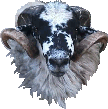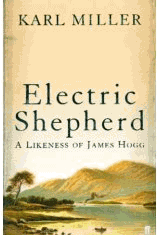James Hogg
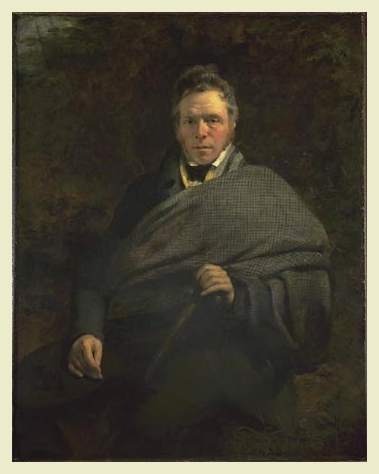
1770-1835
The Poet known as the Ettrick Shepherd, James Hogg spent most of his youth and manhood as a shepherd and was almost entirely self educated. He had learned, at his mother's knee, the great oral tradition of ballads and folklore of the Borders. Her father, "the far-famed Will O'Phaup" was reputed to have been the last man to converse with the fairies.
Hogg's talent for writing was discovered by Sir Walter Scott, who was then the sheriff of Selkirk. It is said that James Hogg and his mother supplied Sir Walter Scott with material for Scott's "Minstrelsy of the Scottish Border"
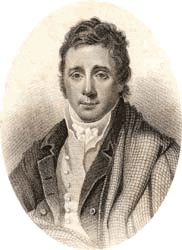
Like Burns and Scott, James Hogg was keenly interested in Song. He published a book of music known as The Forest Minstrel. Originally published in 1810, The Forest Minstrel is the complete collection of songs by Hogg, featuring his first compositions as a shepherd in Ettrick and those inspired by early contact with the literary culture of Edinburgh. Hogg also taught himself to play the fiddle, and rapidly began to make a name for himself as "Jamie the Poeter", a singer of traditional ballards and reciter of the rich folklore of the Scottish Borders.

How foolish are mankind to look for perfection In any poor changeling under the sun! By nature or habit, or want of reflection, To vices and folly we heedlessly run. The man who is modest and kind in his nature, And open and cheerful in every degree, Who feels for the woes of his fellow creature, Though subject to failings is dear unto me.
-The Forest Minstrel
James Hogg was born on a farm near Ettrick Forest in Selkirk and baptized there on December 9. The house that James Hogg was born in was at Ettrick Hall, a few miles from St Mary's Loch. Here a statue commemorates his birth. He lived here for the first seven years of his life. James Hogg had little education, and became a shepherd, living in poverty. His father was a shepherd and he too took on the title, hence his nickname, The Ettrick Shepherd. His employer, James Laidlaw of Blackhouse, seeing how hard he was working to improve himself, offered to help by making books available. Hogg used these to essentially teach himself to read and write. He had achieved this by the age of 14. In 1796 Robert Burns died, and Hogg, who had only just come to hear of him, was devastated by the loss. He struggled to produce poetry of his own, and Laidlaw introduced him to Sir Walter Scott, who asked him to help with a publication entitled The Minstrelsy of the Scottish Border. In 1801, Hogg visited Edinburgh for the first time.
His own collection, The Mountain Bard, was published in 1807 and became a best-seller, allowing him to buy a farm of his own. Having made his name, he started a literary magazine, The Spy, and his epic story-poem, The Queen's Wake (the setting being the return to Scotland of Queen Mary (1561) after her exile in France), was published in 1813 and was another big success. William Blackwood recruited him for the Edinburgh Magazine, and he was introduced to William Wordsworth and several other well-known literary figures. He was given a farm by the Duke of Buccleuch, and settled down there for the rest of his life.
Hogg had already made his reputation as a prose writer with a practical treatise on sheep's diseases; and in 1824 his novel, The Private Memoirs and Confessions of a Justified Sinner, was another major success. He became better known than his hero, Burns, had ever been.
Hogg is primarily remembered today for his experimental novel, The Private Memoirs and Confessions of a Justified Sinner (1824), which was largely dismissed by contemporaries as an obtuse satire on Christian fanaticism. Featuring Gothic and supernatural elements, including a schizophrenic narrator and a psychological double/devil figure, as well as a proto-modern narrative complexity, the work has been rediscovered by modern critics who have come to view it as a masterpiece of prose fiction. Though many of Hogg's works have been neglected for a century and a half, contemporary scholars have begun the process of reevaluating his literary achievements and are generally receptive to his work. Today, Hogg's poetry and essays are not as widely read as in his contemporary era. However "Justified Sinner" remains important and is now seen as one of the major Scottish novels of its time, and absolutely crucial in terms of exploring one of the key themes of Scottish culture and identity: Calvinism. In a 2006 interview with Melvyn Bragg for ITV1, Scottish novelist Irvine Welsh cited Hogg, especially "Justified Sinner" as a major influence on his writing.
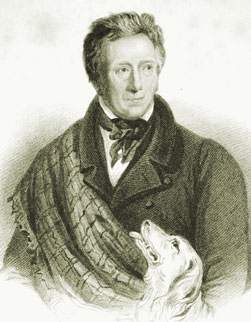
"A shepherd may be a very able, trusty, and good shepherd, without a sweetheart - better, perhaps, than with one. But what is he without his dog?”
-James Hogg
Other works
The Forest Minstrel (1810) (poetry)
The Pilgrims of the Sun (1815) (poetry)
Brownie of Bodsbeck (1817) (novel)
Jacobite Reliques (1819) (collection of Jacobite protest songs)
The Three Perils of Man (1822) (novel)
The Three Perils of Woman (1923) (novel)
Queen Hynde (1925)) (poetry)
Songs by the Ettrick Shephard (1831) (songs/poetry)
The Brownie of the Black Haggs (1828) (short story/tale)
The Domestic Manner and Private Life of Sir Walter Scott (1834) ("unauthorised" biography)
Tales and Sketches of the Ettrick Shepherd (1837)
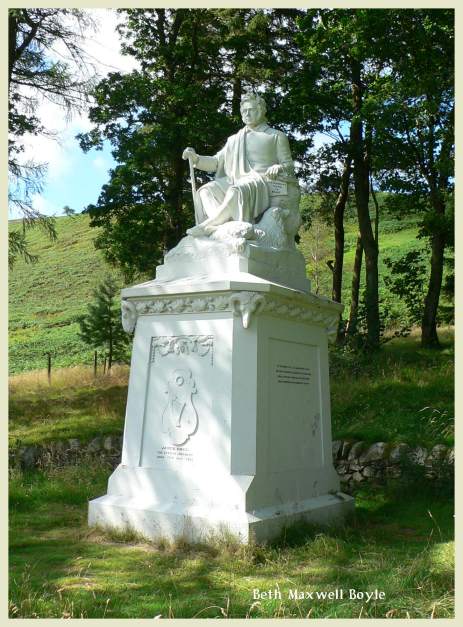
This statue of James Hog and his dog looks over St. Mary's loch in Ettrick, Selkirkshire where James and his family lived. Unfortunately the house is no longer there but the statue of Hogg sits on the site. James Hogg's Monument stands almost opposite St. Mary's Cottage. It was dedicated on June 28th 1860, having been made by a Mr. Andrew Currie, FSA 1770, Ettrick, Selkirkshire - 21 November 1835
|
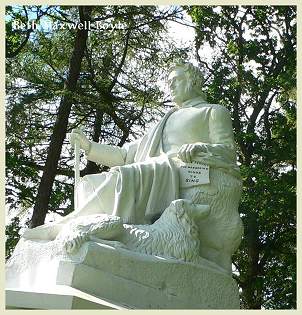
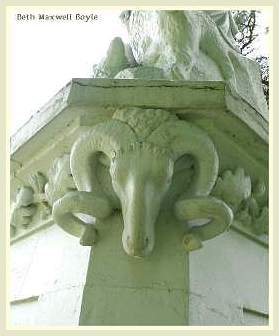
Caledonia
James Hogg
Caledonia! thou land of the mountain and rock,
Of the ocean, the mist, and the wind-
Thou land of the torrent, the pine, and the oak,
Of the roebuck, the hart, and the hind;
Though bare are thy cliffs, and though barren thy glens,
Though bleak thy dun islands appear,
Yet kind are the hearts, and undaunted the clans,
That roam on these mountains so drear!
A foe from abroad, or a tyrant at home,
Could never thy ardour restrain;
The marshall'd array of imperial Rome
Essay'd thy proud spirit in vain!
Firm seat of religion, of valour, of truth,
Of genius unshackled and free,
The muses have left all the vales of the south,
My loved Caledonia, for thee!
Sweet land of the bay and wild-winding deeps
Where loveliness slumbers at even,
While far in the depth of the blue water sleeps
A calm little motionless heaven!
Thou land of the valley, the moor, and the hill,
Of the storm and the proud rolling wave-
Yes, thou art the land of fair liberty still,
And the land of my forefathers' grave!
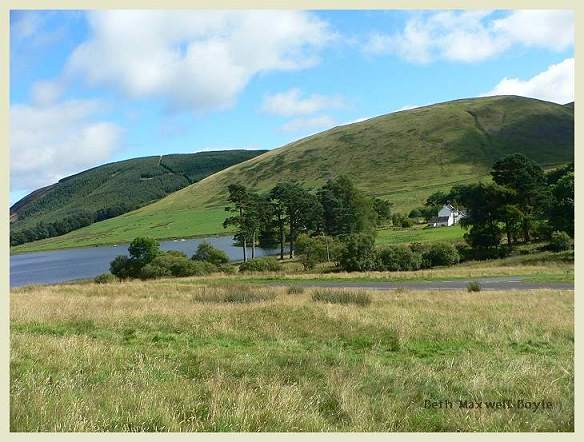
View of Saint Mary's Loch from the Memorial's vantage point.
Hogg was born in 1770 at Ettrickhall farm in the Ettrick valley: the cottage where he was born does not survive, but a Victorian monument marks the spot. His father, a sheep-farmer, became bankrupt in 1777, and as a result the young Hogg's formal schooling came to a premature end, the rest of his childhood being spent working as a cowherd and later as a shepherd. During his twenties, Hogg was employed as a shepherd by a relative of his mother's, Mr Laidlaw of Blackhouse farm, in Yarrow. At Blackhouse Hogg had access to a good collection of books; and he began to read widely, and also to write. Thereafter Hogg earned his living partly through various farming projects, and partly as a professional writer. In these roles he divided much of his time between Edinburgh and his native Ettrick Forest.
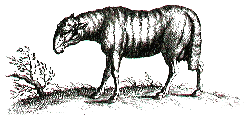
Hogg published mainly poetry until he was in his late forties. A particularly notable poem from this period is The Queen's wake (1813), a book-length narrative in which the poets of Scotland assemble at Holyrood Palace for a bardic contest to celebrate the return of Mary Queen of Scots from France. A notable series of novels followed: The Brownie of Bodsbeck (1818); The Three perils of Man (1822); The Three perils of Woman (1822); The Private memoirs and confessions of a justified sinner (1824). An epic poem, Queen Hynde, followed in 1825: this is an exuberant and lively piece that is in essence Hogg's alternative version of James Macpherson's Ossian poem, Fingal. Many of Hogg's best later poems were collected in A Queer book (1832).
Hogg's writings explore the supernatural with great power and sophistication, as in The Justified sinner, which is regarded by many as the greatest of all Scottish novels. Equally powerful is The Three perils of Woman, which explores the terrible aftermath of Culloden. The Three perils of Man is Hogg's version of a Medieval romance. Overflowing with vivacity, this novel is full of devilry and witchcraft. Much of the action takes place at Aikwood in the Ettrick valley, where Gibbie Jordan witnesses a wedding between a demon and a witch. The happy couple retire to "a bower of the most superb magnificence"; and what happens next is later described by Gibbie to the King and Queen of Scots:
... at length the lusty bridegroom, as I supposed, began to weary of his mate, for I saw the form of the bower beginning to change, and fall flat on the top, and its hue also become of a lurid fiery color. I cannot tell your Majesties what sort of sensations I felt when I saw the wedded couple sinking gradually down through a bed of red burning fire, and the poor old beldame writhing to death in the arms of a huge and terrible monster, that squeezed her in its embraces, and hugged her, and caressed her till the spark of wretched life was wholly extinguished.
Aikwood Tower was until recently the home a Hogg exhibition that was open to the public during the tourist season. The Hogg exhibition has since moved as Aikwood is no longer open to the public. The James Hogg Exhibition is now at Bowhill House: www.bowhillhouse.co.uk. Current interest in Hogg is also reflected in the fact that a multi-volume edition of his Collected works (prepared under the auspices of the University of Stirling and the University of South Carolina) is being published by the Edinburgh University Press.
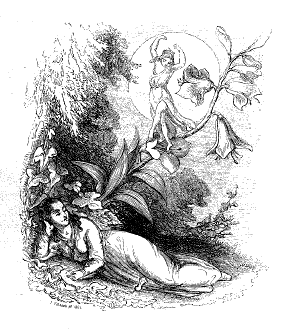
James Hogg
References and Links of Interest
* Full color painting of James Hogg at the Top of the page
By Sir John Watson Gordon, 1830
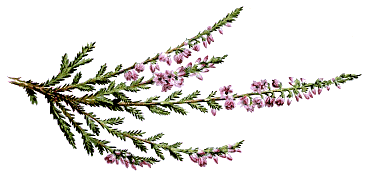
Copyright 2007 , Jim & Beth Boyle, All Rights Reserved
No part of this website may be used for any purpose ( including using images )
without written consent from The Rams Horn
